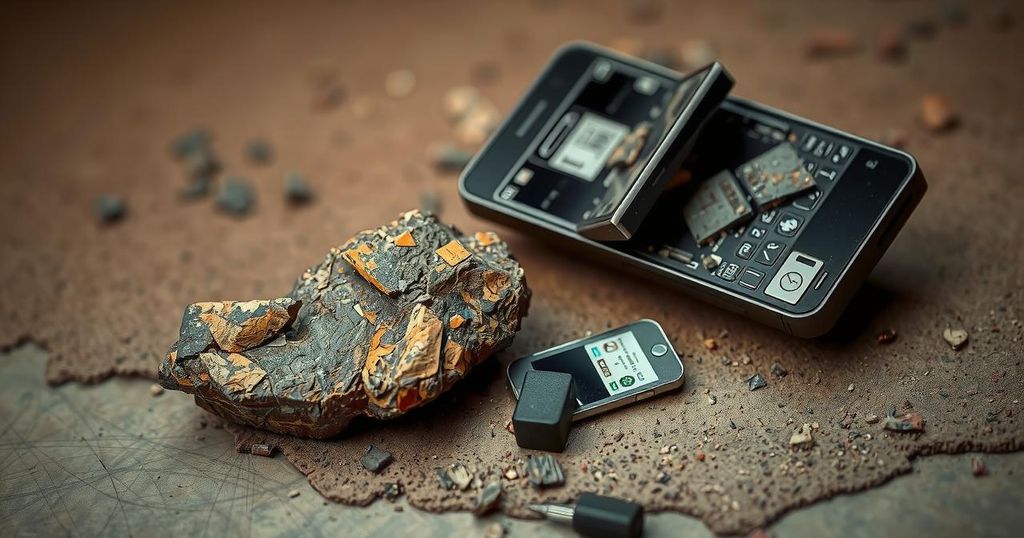Conflict Minerals: The Hidden Link Between Mobile Phones and Violence in DR Congo

Mobile phones utilize tantalum, a metal largely sourced from the conflict-prone eastern Democratic Republic of Congo. The M23 rebel group controls critical mining areas, linking the global demand for technology with continued violence. Certification efforts to monitor mineral origins are often circumvented, raising ethical concerns for companies like Apple, which have faced legal action over sourcing practices. This situation highlights the need for more stringent measures to prevent conflict minerals from entering the global market.
Mobile phones contain tantalum, a rare metal sourced primarily from the eastern Democratic Republic of Congo (DR Congo), a region currently experiencing conflict. This metal is fundamental to the operation of smartphones and other electronics. Regrettably, the ongoing violence is associated with the M23 rebel group, which has gained control over significant mining areas, exacerbating the region’s instability while tapping into coltan resources.
The M23 has aggressively expanded its influence in east DR Congo, particularly in mineral-rich regions. Taking strategic locations like Goma and Rubaya, they not only fortified their military stance but also turned mining into a lucrative trade. The M23’s control over coltan extraction is vital for funding their activities, resulting in an intricate link between mobile technology and regional conflict.
Mineral extraction in this area is largely informal, with many individuals engaged in hazardous mining practices. As the M23 has tightened its grip, they have implemented a quasi-governmental structure, demanding fees from miners and traders, ultimately monopolizing the lucrative coltan trade. Reports indicate that this generates significant revenue for the group, which is likely funding their military operations.
Despite certification schemes intended to ensure conflict-free minerals, practical challenges hinder their effectiveness. Experts observe that the dispersed nature of small-scale mining complicates monitoring, leading to potential corruption. This situation enables the flow of uncertified coltan into global supply chains, raising questions about the true origins of the mineral.
Rwanda plays a controversial role in this scenario, being a critical transit point for coltan. Despite possessing its own mining operations, Rwanda’s imports of uncertified coltan from DR Congo have surged, prompting concerns about contamination of supply chains. Some accuse the Rwandan government of benefitting from instability in DR Congo, even as Rwanda’s leadership refutes these claims.
The conflict’s impact extends beyond local communities, as it sees multinational corporations scrutinizing their supply chains amid rising allegations of using conflict minerals. DR Congo’s government has taken legal action against companies like Apple for allegedly sourcing conflict minerals. Apple has since ceased sourcing tantalum from DR Congo and Rwanda, highlighting the ethical concerns tied to global technology supply chains.
The ongoing violence in eastern DR Congo prompts serious ethical considerations for smartphone manufacturers regarding their sourcing practices. As armed groups continue to dominate mineral extraction, the challenge remains in ensuring conflict minerals do not reach international markets, stressing the necessity for effective monitoring and certifications system.
The Democratic Republic of Congo has been mired in conflict for decades, largely driven by competition for valuable minerals, including coltan, from which tantalum is extracted. The M23 rebel group has exploited this situation, taking over key mining sites and leveraging control of resources to fund their military activities. Attempts to regulate these mined resources through certification schemes have faced significant obstacles, including corruption and challenges in tracking the mineral’s origin. This has raised concerns globally, especially among technology companies that rely on these minerals for manufacturing mobile devices.
The relationship between mobile phone manufacturing and conflict in the Democratic Republic of Congo is profound, as the demand for tantalum fuels ongoing violence. The M23 rebel group capitalizes on this demand, establishing control over lucrative mining regions. Although initiatives exist to certify conflict-free minerals, their ineffectiveness allows conflict minerals to permeate global supply chains, increasing the urgency for companies to scrutinize their sourcing practices to avoid complicity in human rights abuses in the region.
Original Source: www.bbc.com








